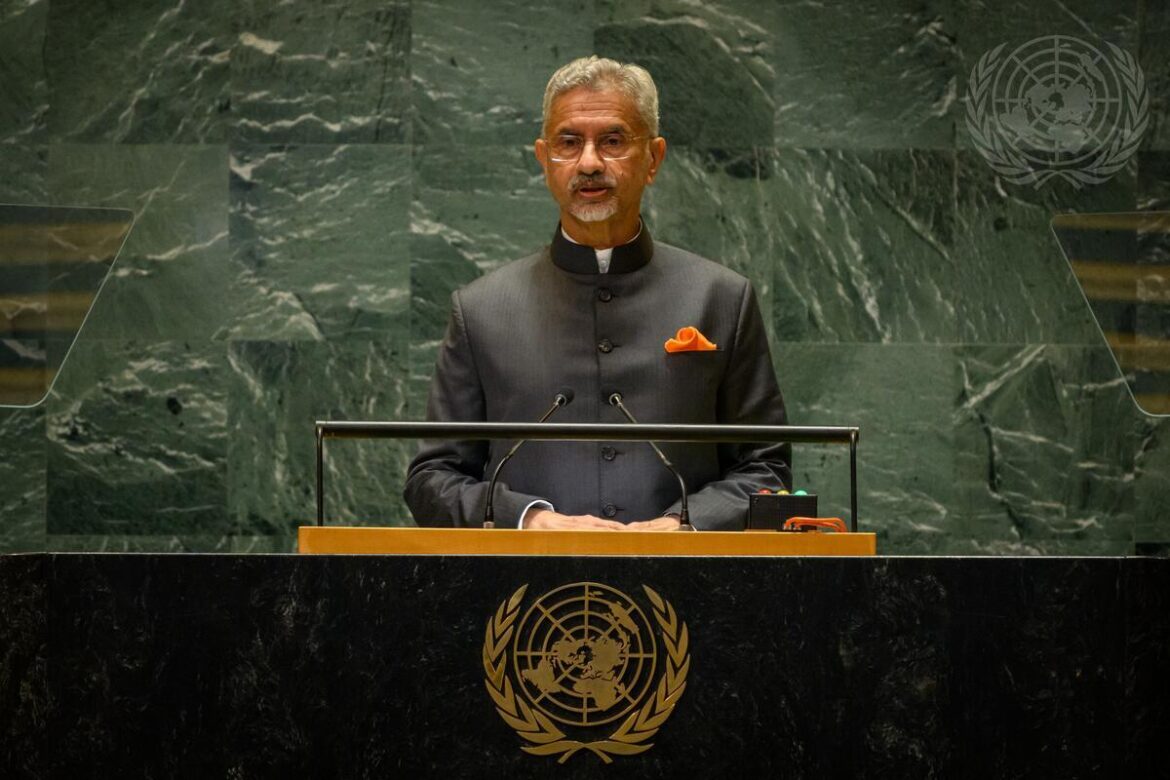Asserting that “Terrorism is antithetical of everything the world stands for” India’s Foreign Minister, S Jaishankar while addressing the 79th Session of the United Nations General Assembly (UNGA) on September 28, 2024, in New York, noted “Pakistan’s cross-border terrorism policy will never succeed,” and it should not expect to escape accountability.
“Many countries get left behind due to circumstances beyond their control. But some make conscious choices with disastrous consequences,” Jaishankar said, citing Pakistan as a prime example. He noted that unfortunately, Pakistan’s actions impact others, especially their neighbors.
Jaishankar condemned Pakistan for promoting fanaticism, asserting that this has led to a GDP characterized by radicalization and exports defined by terrorism. He remarked that the harm they intended for others is now consuming their own society, and pointed out “It can’t blame the world; this is only karma.”
“We heard some bizarre assertions from it at this forum yesterday. So let me make India’s position perfectly clear,” he added.
In response to Pakistani Prime Minister Muhammad Sharif’s UNGA speech on September 27, where Sharif accused India of taking “unilateral steps to impose a final solution for Jammu and Kashmir,” Jaishankar countered that Pakistan’s obsession with coveting the land of others must be addressed.
Warning that “actions will certainly have consequences,” Jaishankar emphasized that the remaining issue between India and Pakistan is the return of illegally occupied Indian territory and the end of Pakistan’s commitment to terrorism.
Touching upon Ukraine and Gaza, Jaishankar expressed, “We are gathered here at a difficult time. The world is yet to recover from the ravages of the Covid pandemic. A war in Ukraine is well into its third year. The conflict in Gaza is acquiring wider ramifications.”
The world cannot ignore the continuation of large-scale violence or its consequences, as seen in the war in Ukraine and the conflict in Gaza, he cautioned adding that the international community should address these concerns and urgently find solutions.
He noted, “Across the Global South, development plans have gone off the rails and SDG targets are receding. But there is more. Unfair trade practices threaten jobs, just as unviable projects raise debt levels. Any connectivity that flouts sovereignty and territorial integrity acquires strategic connotations. Especially when it is not a shared endeavor.”
According to him, advancements in technology have become a source of anxiety, while climate events grow more severe and frequent. Food and health security are also major concerns.
He also reminded the body that the world is currently divided and frustrated, making meaningful dialogue and agreements difficult. This is far from what the founders of the United Nations envisioned, who, eight decades ago, focused on ensuring world peace as the foundation for global prosperity. Today, both peace and prosperity are at risk.
While highlighting India’s global relevance and experience, he said “When India lands on the moon, rolls out its own 5G stack, dispatches vaccines worldwide, embraces fintech or houses so many Global Capability Centres, there is a message here. Our quest for a ‘Viksit Bharat’ or developed India will understandably be followed closely.”
Jaishankar emphasized that the “over-concentration of production” has weakened many economies, affecting jobs and social stability. He advocated for democratizing global production, building resilient supply chains, promoting trusted digital services, and fostering an open-source culture to ensure broader prosperity. He highlighted that both economic and social solutions are essential.
Addressing the challenges in achieving Sustainable Development Goals (SDGs), Jaishankar noted that human dignity is at risk, not just economies. He urged the United Nations to reflect on how this situation arose, attributing the issues to structural flaws, political motives, self-interest, and neglect of the marginalized.
In response to global challenges, Jaishankar mentioned that India has taken various steps to address these concerns.
He went on to list those priorities: “First, by focusing on the issues of the vulnerable, women, farmers and youth. And fashioning targeted policies and initiatives for their betterment; Second, by expanding opportunities for employment and entrepreneurship, including through stronger training and large-scale financial incentives; Third, by creating templates that are replicable elsewhere. It could be digital delivery or enhancing the quality of governance and public services; Fourth, by encouraging the Global South to voice its shared concerns and come together; and fifth, by contributing to the well-being of the global commons and responding to the pressing needs of those in distress.”
Considering the significant transformations taking place in India, each of these aspects highlights that global challenges can indeed be addressed. He pointed out that collaboration is key to achieving progress.
Emphasizing that the United Nations cannot remain “anachronistic,” Jaishankar said “Reforming multilateralism is, therefore, an imperative.”
“Large parts of the world cannot be left behind when it comes to deciding the key issues of our times. An effective and efficient UN, a more representative UN and a UN fit for purpose in the contemporary era, is essential,” he argued.






